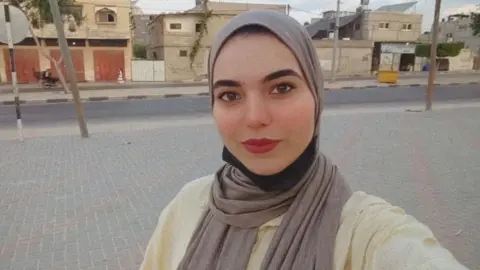‘We have been waiting a long time’ – Palestinians react to ceasefire deal
“We have been waiting for this for a long time,” 17-year-old Sanabel says. “Finally, I will put my head on my pillow without worrying.”
She is one of millions of Palestinians across Gaza celebrating the ceasefire deal that the US and mediators Qatar say was agreed by Israel and Hamas on Wednesday after 15 months of war.
Part of the first phase of the deal, which takes effect on 19 January, will see Israeli forces pull back from populated areas of Gaza, allowing displaced Palestinians to return to their homes. Hundreds of aid lorries will also be allowed into the territory each day.
Those in Gaza have spoken of their joy and relief, but also their sadness and worry as they mourn killed loved ones, and begin rebuilding the territory after more than a year of devastation.
Speaking to the BBC World Service after news of the ceasefire, Sanabel, who is in Gaza City, said: “Finally! We got what we wished for! All of us are delighted now!”
She said her family planned to return home “in the middle of the night” in her father’s newly repaired car.
Both Qatar and the US confirmed the ceasefire and hostage release deal after negotiations progressed in recent weeks, prompting celebrations both in Gaza and from Israeli hostages’ families.
A Hamas official said earlier it had approved the draft agreement from mediators. The Israeli prime minister’s office said there were “several unresolved clauses” but hoped details could be finalised on Wednesday night.
The deal will come into effect on Sunday providing it is approved by the Israeli cabinet.
“I feel great, I have never been this happy before,” Dima Shurrab, 19, told the BBC in a WhatsApp message from Khan Younis. “I can’t believe what’s happening around me now. Am I dreaming?”
“We are happy in Gaza, but we are afraid. The fear will disappear when the agreement enters into force.”
Just two months ago, Shurrab ended a call with the words “pray we stay alive”.

Her family was living in a partially-destroyed home after evacuating multiple times. They survived on bread, nuts, peas, beans and some very expensive vegetables. She walked up to two kilometres to get water and lit wood fires because she had no cooking gas.
She had a scholarship to study medicine in Algeria, but the war broke out two days after she submitted her passport to get a visa. She could not afford to pay a broker around $5,000 (£4,088) to leave through Rafah – her only option until May, when that crossing closed.
“I felt that my future, my dreams were being blocked,” she said.
Now though, a ceasefire brings her ambition to become a doctor closer.
The first phase of the agreement, lasting six weeks, will also see 33 of the almost 100 hostages held by Hamas exchanged for Palestinian prisoners in Israeli jails.
Negotiations for the second phase would start on the 16th day of the ceasefire. It should see the remaining hostages released, a full Israeli troop withdrawal and a “sustainable calm”.
The third and final stage would involve the reconstruction of Gaza, which could take years, and the return of any remaining hostages’ bodies.
‘Swinging between joy and sadness’
Farida, a teacher displaced from the north of Gaza, said she has not seen her mother, father and brothers for more than a year.
Speaking from Deir al-Balah in central Gaza, she told BBC Arabic’s Gaza lifeline: “We currently experience a state of anticipation, fear and anxiety.
“We are also going through feelings of eagerness… We are trying to breathe freedom which we have been denied.
“No matter how much I talk, I will not be able to describe the mixed feelings overwhelming me and the happiness I feel now for returning to the north.”
Reem, a mother who was also displaced from the north where she lost her home, told the programme: “Thank God we are finally living this moment that we have never expected.
“The feeling I am going through now swings between joy and sadness.”
Hashim Adel Abu Eiala, speaking in Khan Younis, told the BBC he was experiencing “the greatest feeling in the world”.
“We have been waiting for more than a year and three months in this suffering, death, destruction, killing and hunger.
“We have been patient and showed steadfastness no other people in the world or the Arab region showed before.”
He has been living in a tent for 15 months and will “kneel down to thank God” when he returns home, he said, adding: “We wish this joy ends well.”
The Israeli military launched a campaign to destroy Hamas in response to the group’s unprecedented attack on southern Israel on 7 October 2023, in which about 1,200 people were killed and 251 others were taken hostage.
More than 46,700 people have been killed in Gaza since then, according to the territory’s Hamas-run health ministry.
Most of the 2.3 million population has also been displaced, there is widespread destruction, and there are severe shortages of food, fuel, medicine and shelter due to a struggle to get aid to those in need.



